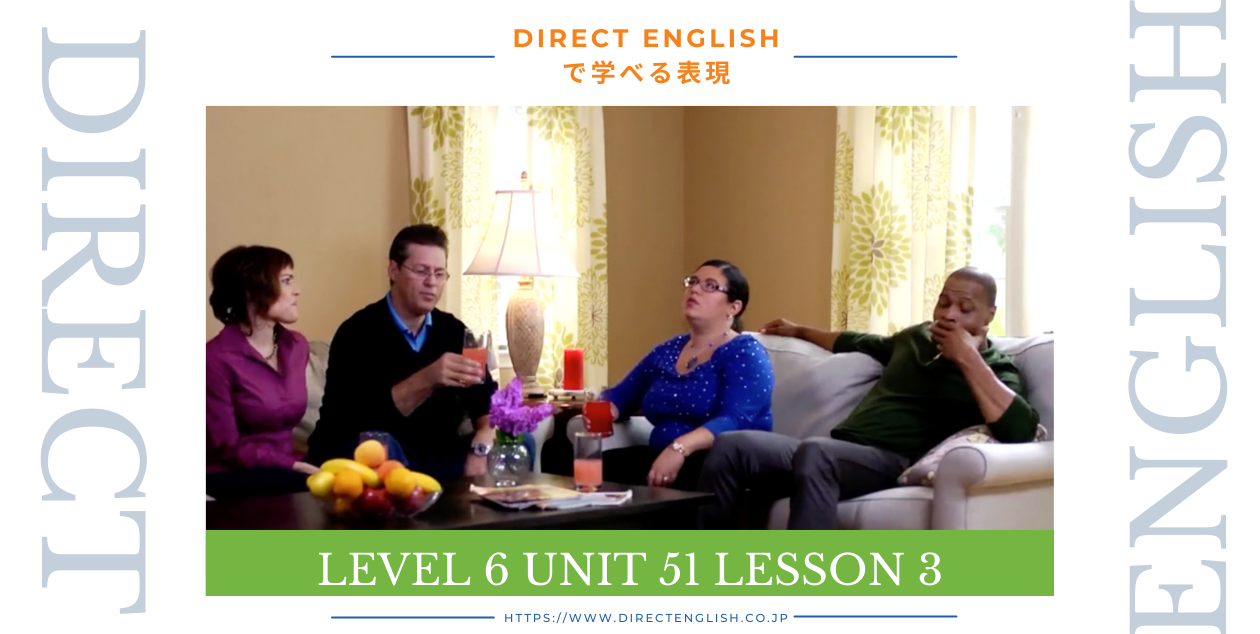
今回のレッスンでは、Yvonne, Richard, Nancy, Douglasが週末について話し合う様子を通じて、日常英会話や週末の計画について学びます。彼らは週末の短さについて話し合い、疲れを取るために十分な休息が必要であることを感じています。この会話では、週末の計画や疲労回復についての重要性がテーマとなります。
1. レッスン3の概要と登場人物
Yvonne, Richard, Nancy, Douglasが週末について話し合います。彼らは週末の短さについて話し合い、疲れを取るために十分な休息が必要であることを感じています。

Situation:
Yvonne, Richard, Douglas and Nancy are all together at the end of the week.
Question:
How do they all feel at the end of the week?
Nancy Hobart
Yvonne
Richard Hobart
Douglas
2. Lesson 3で学べる英語フレーズ
- 1. What a week!
-
意味:なんて週だ!
解説:「What a~」は感嘆文で、驚きや感動を表現します。
例文:What a day! I can’t believe everything that happened.
和訳:なんて日だ!何が起こったか信じられない。 - 2. Do we have plans for tonight?
-
意味:今夜の予定はありますか?
解説:「Do we have plans for~」は特定の時間の予定を尋ねる疑問文です。
例文:Do we have plans for the weekend?
和訳:週末の予定はありますか? - 3. I’m beginning to realize that’s not going to happen.
-
意味:私はそれが起こらないだろうと徐々に気づき始めている。
解説:「I’m beginning to realize」は徐々に理解し始める過程を示し、「that’s not going to happen」は未来の否定を示します。
例文:I’m beginning to realize that I need more time to finish this project.
和訳:私はこのプロジェクトを終わらせるにはもっと時間が必要だと徐々に気づき始めている。 - 4. Why are weekends only two days?
-
意味:なぜ週末は二日間しかないの?
解説:「Why are~」は理由を尋ねる疑問文で、「only two days」は限られた期間を強調します。
例文:Why are holidays so short?
和訳:なぜ休暇は短いのか? - 5. I dread getting up out of the chair.
-
意味:私は椅子から立ち上がるのが怖い。
解説:「I dread~ing」は強い恐怖や嫌悪感を示し、「getting up out of the chair」は具体的な行動を指します。
例文:I dread going to the dentist.
和訳:私は歯医者に行くのが怖い。 - 6. Originally, I thought we could go out for something to eat.
-
意味:元々、私たちは何か食べに出かけることができると思った。
解説:「Originally」は初期の計画や考えを示し、「I thought」は過去の考えを述べます。「we could go out for something to eat」は可能性を示します。
例文:Originally, I thought we could watch a movie at home.
和訳:元々、私たちは家で映画を見ることができると思った。 - 7. I’d be happy sitting here all night.
-
意味:私は一晩中ここに座っているのが幸せです。
解説:「I’d be」は仮定や希望を示し、「happy」は満足や喜びを表します。「sitting here all night」は現在の状況を指します。
例文:I’d be happy staying at home this weekend.
和訳:私は今週末家にいるのが幸せです。 - 8. Do you remember coming home from work on Friday night, and lying down for a rest before we’d go out?
-
意味:金曜日の夜に仕事から帰ってきて、出かける前に休むために横になったことを覚えていますか?
解説:「Do you remember」は過去の出来事について尋ねる疑問文で、「coming home」や「lying down」は動名詞で具体的な行動を示します。
例文:Do you remember going to the beach last summer?
和訳:昨夏に海に行ったことを覚えていますか? - 9. We’d wake up on Saturday morning.
-
意味:私たちは土曜日の朝に起きることになっていた。
解説:「We’d」は過去の習慣を示し、「wake up」は「起きる」という意味の動詞フレーズです。「on Saturday morning」は特定の時間を指します。
例文:We’d have breakfast together every Sunday.
和訳:私たちは毎週日曜日に一緒に朝食をとることになっていた。 - 10. I need at least three to recover from the week.
-
意味:私は一週間の疲れを取るために少なくとも三日が必要です。
解説:「I need」は必要性を示し、「at least」は最低限必要な量を強調します。「three」は日数を指し、「to recover from the week」は目的を示します。
例文:I need at least an hour to finish this work.
和訳:私はこの仕事を終わらせるために少なくとも一時間が必要です。
4. 「The Importance of Weekends for Recovery」というテーマでエッセイを書く。
ライティングのコツと準備方法
- 主題を決める:例えば「週末の重要性」
- アウトラインを作成:主要なポイントを箇条書きにする
- 具体的な詳細を考える:経験談など具体的な事例
- 学んだ表現を組み込む:レッスンで学んだフレーズを使用する
- 感情や雰囲気を描写する:読者が情景を想像できるようにする
ライティング見本
Title: The Importance of Weekends for Recovery
Weekends are crucial for recovery from the stresses of the week. Recently, Yvonne, Richard, Nancy, and Douglas discussed how they felt about the end of the week. Yvonne exclaimed, “What a week!” highlighting the exhaustion they all felt.
Nancy initially planned to go out for dinner, but they soon realized they were too tired. Richard suggested just sitting at home, which everyone agreed was the best plan. They reminisced about past routines where they would often sleep in on Saturdays after planning to go out on Fridays.
In conclusion, weekends provide essential downtime for rest and rejuvenation. By acknowledging the importance of these breaks, we can better manage our work-life balance and return to our daily routines with renewed energy.
5. まとめ:家族の絆を大切にするために
このレッスンでは、Yvonne, Richard, Nancy, Douglasの会話から週末の計画や疲労回復について学びました。「What a week!」や「I need at least three to recover from the week.」など、感嘆文や疲労回復の必要性を示すフレーズが役立ちます。この知識を活用して、英語で週末の計画を話すスキルを向上させましょう!

